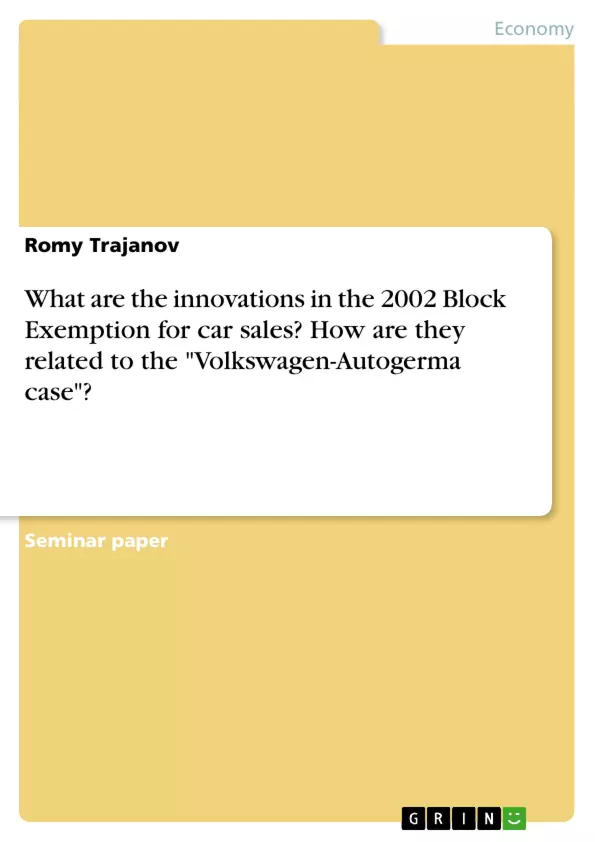The European Commission proposed certain block exemptions about motor vehicles, which is very important for the European Union’s competition policy, because the car industry is one of the biggest in Europe. Due to these regulations on the one hand European consumer shall achieve benefits for vehicle sales and servicing, and on the other hand there is an increasing degree of competition between dealers in this sector. The following case study will illustrate some important aspects on the latest Block Exemption 1400/2002 on car distribution and servicing agreements on the basis of the example of the German car manufacturer 'Volkswagen'.
Inhaltsverzeichnis (Table of Contents)
- Introduction
- European Single Market and the EU competition policy
- European market conditions in automobile sector before introducing block exemptions on the basis of the 'Volkswagen' case
- What is a 'Block Exemption'?
- Innovations of Block Exemption 1400/2002 in relation to the Volkswagen case
- Conclusion
Zielsetzung und Themenschwerpunkte (Objectives and Key Themes)
This case study investigates the impact of the 2002 Block Exemption for car sales on European Union competition policy, focusing specifically on the 'Volkswagen-Autogerma' case. The work aims to clarify the significance of the exemption for the automobile sector and analyze its connection to the Volkswagen case.
- The role of competition policy in the European Single Market
- The impact of block exemptions on the automobile industry
- The 'Volkswagen-Autogerma' case and its implications for competition policy
- The benefits and challenges of selective distribution networks for car manufacturers
- The evolving dynamics of the European car market
Zusammenfassung der Kapitel (Chapter Summaries)
- Introduction: This chapter provides an overview of the European Commission's proposed block exemptions for motor vehicles and their significance for EU competition policy. The importance of the car industry in Europe and the implications of the regulations for both consumers and car dealers are highlighted. The 'Volkswagen' case is introduced as a key example for exploring the latest Block Exemption.
- European Single Market and the EU competition policy: This chapter discusses the principles of the European Single Market, emphasizing the free movement of goods, persons, services, and capital. The role of competition policy in ensuring fair competition and promoting economic efficiency is examined. The impact of the Euro on price transparency within the EU is also discussed.
- European market conditions in automobile sector before introducing block exemptions on the basis of the 'Volkswagen' case: This chapter focuses on the 'Volkswagen group' and its market share in the EU. The case of 'Autogerma SpA', a Volkswagen subsidiary in Italy, is used to illustrate the challenges of selective distribution networks and the impact of currency fluctuations on car sales.
- What is a 'Block Exemption'?: This chapter defines the concept of block exemptions and their purpose within EU competition policy. The rationale behind allowing vertical constraints in the automobile sector to improve production and distribution of vehicles is explained.
Schlüsselwörter (Keywords)
The main keywords and focus topics of this study include the European Single Market, EU competition policy, block exemptions, the automobile sector, selective distribution networks, the 'Volkswagen-Autogerma' case, and the impact of vertical constraints on competition.
What is a 'Block Exemption' in EU law?
A Block Exemption is a regulation that exempts certain categories of agreements from general competition rules, allowing for vertical constraints like selective distribution in the car industry.
What were the innovations of the 2002 Block Exemption (1400/2002)?
It aimed to increase competition between dealers, improve consumer benefits in sales and servicing, and reduce the power of manufacturers over their distribution networks.
How is the Volkswagen-Autogerma case related to these rules?
The case illustrated how manufacturers sometimes tried to restrict cross-border sales within the Single Market, which led to stricter regulations to ensure fair competition.
What are the benefits of the Single Market for car buyers?
The Single Market promotes price transparency and allows consumers to purchase vehicles in any EU country, theoretically leading to lower prices and better service.
Why is competition policy crucial for the European car industry?
As one of Europe's largest industries, fair competition ensures economic efficiency, innovation, and prevents monopolies that could harm consumers.



